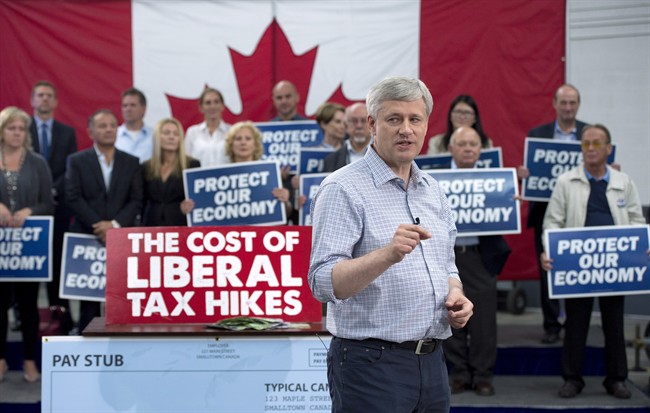The Conservatives are making some big promises for job growth on the campaign trail.

Taking credit for creating almost 1.3-million jobs since the global recession, leader Stephen Harper is vowing to add more.

“Our target: To create an additional 1.3-million net new jobs by 2020. Since 2006, Canada has led G7 countries like the United States, Britain and France, when it comes to job creation. We have a positive plan to ensure our economy continues to create jobs. A plan based on lower taxes and maintaining balanced budgets.”
How True Is It?
Numbers from Statistics Canada show 1.24-million new full-time jobs and 50,000 new part-time jobs were created in Canada between June of 2009 and August of 2015.

Promising a repeat performance
How difficult will it be for Canada to repeat post-global recession job creation?
The Canadian Centre for Policy Alternatives says, not very.
A blog by CCPA economist David Macdonald suggests that by 2020, there will be as many as 2.6-million more Canadians over the age of 15.
But, that math doesn’t account for more retirees. And as Statistics Canada announced this week, seniors now outnumber children. So, how much weight does one put on this prediction?
Stimulus spending
It is also important to note that the federal government spent quite a bit of money in the years following the global recession.
In fact, it spent more than $14.5-billion in direct infrastructure stimulus between 2009 and 2012, according to this table from the final report from Canada’s Economic Action Plan.
New infrastructure spending?
More recent plans by the Conservatives don’t include massive infrastructure spending.
While the New Building Canada Plan announced last year also pledged $14-billion for infrastructure, that funding is over 10 years, not three.

Infrastructure spending and jobs
How vital is infrastructure spending for job creation?
Paul Beaudry from UBC’s Vancouver School of Economics says it can be vital if unemployment is high.
“When there’s a lot of slack, on top of kind of providing an environment for the future, it might actually keep employment going on the short run, while people are having trouble finding jobs. But, if [government] is doing it when already the labour market is very tight, it just displaces jobs. It hires people on these projects instead of them doing something else.”
Beaudry adds, there is some long-term growth that comes from the spending as well because infrastructure improvements make it easier to move goods.
Environment for business
Another key issue for job growth is to make an environment favourable for the private sector to create jobs.
Beaudry says cutting red tape and creating a favourable tax environment goes a long way.
But Beaudry notes, in terms of comparing several of Canada’s major parties, there does not appear to be a large difference in policy when it comes to fostering that environment.
He says global factors will and have played a much bigger role on the side of job creation and job loss, as Canada has seen with the impact of oil prices.







Comments